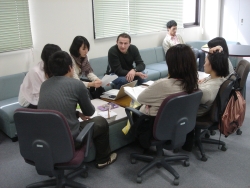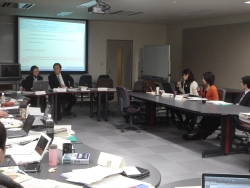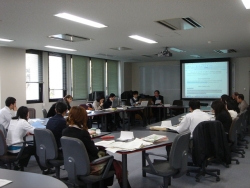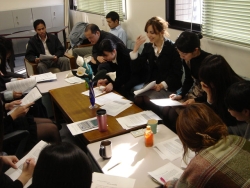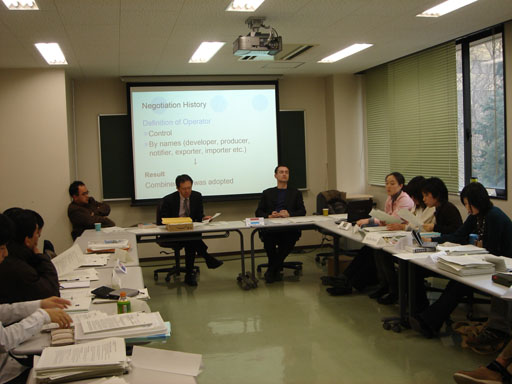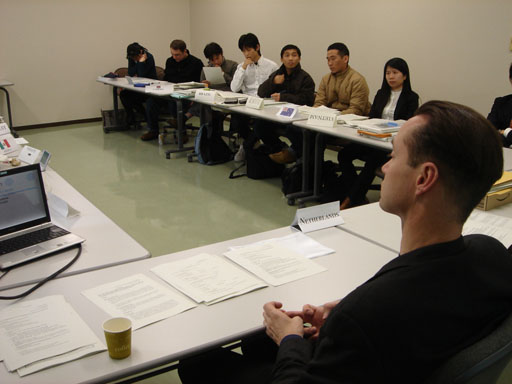| 2013 | International Environmental Law |
|---|---|
| Multilateral Treaty Negotiation (Fall Semester) |
|
| 2012 | Multilateral Treaty Negotiation (Fall Semester) |
| 2011 | International Environmental Law (Spring Semester) |
| Multilateral Treaty Negotiation International Fieldwork: Cartagena, Columbia (planned) (Fall Semester) |
|
| 2010 | Multilateral Treaty Negotiation (Fall Semester) |
| 2009 | International Environmental Law |
| 2008 | Multilateral Treaty Negotiation (Fall Semester) |
| 2007 | International Environmental Law (Fall semester) |
| Multilateral Treaty Negotiation (Fall Semester) |
|
| Special Seminar by Mr. Rene Lefeber> | |
| 2006 | International Cooperation Law (Mock Treaty Negotiations) |
2013 Multilateral Treaty Negotiation (Fall Semester, Monday, 3rd period)
In 2013-14, we have conducted a moot court based on the Whaling in the Antarctic case now pending before the ICJ. For details, see the Japanese page (in English).
2013 International Environmental Law (Spring Semester, Monday, 3rd period)
Class Schedule #1 and Reading Assignments: April 9 to May 27
Class Schedule #2 and Reading Assignments: June 10 to July 29
For the separate, hidden page to download reading material, contact the Professor.
2012 Multilateral Treaty Negotiation (Fall Semester, Monday, 3rd period)
The Contact Group to Negotiate the TOR of the Basel Compliance Mechanism: see here.
Class Schedule #1 from Oct.1 to Nov. 26
Class Schedule #2 from Nov. 26 to Feb. 4
2011 International Environmental Law (Spring Semester, Monday, 3rd period)
Textbook : Daniel Bodansky, The Art and Craft of International Environmental Law, Harvard University Press, 2010.
Class Schedule#1 and Reading Material: April 11 to May 9
Class Schedule #2 and Reading Material: May 23 to June 20
Class Schedule #3 and Reading Material: June 27 to July 11
2011 Multilateral Treaty Negotiation (Fall Semester, Monday, 3rd period)
2010 Multilateral Treaty Negotiation (Fall Semester, Monday, 3rd period)
In 2010, we have taken up the negotiation on the Supplementary Protocol on Liability and Redress to address damage to biodiversity arising from LMOs. Most of the students, in October 2010 at Nagoya, observed the real negotiation and the adoption of the same treaty, interviewed the delegations whom they are going to represent in the mock negotation, and reported on the delegations’ positions and views on the Supplementary Protocol and to LMOs generally. In the mock negotiation that started from December 2010 and lasted until February 2011 as a part of the class Multilateral Treaty Negotiation, the students used a different negotiating text specially prepared by the instructor and operated under a different Rules of Procedure (majority voting as the last resort was possible). So the mock negotiation in this class was not just an exact recreation of the real negotiation; but a newly created one more focused on legal issues for educational purposes. As in the real negotiation, the mock negotiation was conducted in English in its totality.
Before the mock negoation began, the students learned the basic knowledge of the relevant international law (cf. Cartagena Protocol on Biosafety, liability regimes under international law) and had the chance to closely analyze the Nagoya-Kuala Lumpur Supplementary Protocol that was adopted in the real world. The students were able to familiarize with the relevant legal issues confronting the liability regime dealing with biodiveristy damage arising from LMOs. In December, there was one class on “Basic knowledge of diplomatic/treaty negotiation” where some technical terms such as “raising a flag” that are often used in the negotiation were introduced. Then we took two hours to analyze “our” negotiating text, the purpose of which is to objectively examine the text and understand the legal issues that must be resolved during the mock negotiation.
The instructor of this class (Professor Shibata) acts both as the chair of the negotiating group and the Foreign Minister of all delegations who dispatches confindetial “Instructions” to them. Thus, the students as delegations must negotiate in accordance with the “Instructions”. Thus, this mock negotiation is not just a game but a real negotiation to achieve a certain goal on legal issues utilizing legal arguments and legal (drafting) techniques.
Country Name Brazil Chanapat MANEEDUL China (People's Republic of) Mari SAKAGUCHI Colombia Mai FUJII Egypt Ayaka KOJIMA Namibia (African Group Coordinator) Masakuni UETA European Union Chihiro SAITO Hungary Marko Szilveszter MACSKOVICH India Yuko HIRATA Japan Sayaka ADACHI
Tadaatsu MOHRIMalaysia Yoko ONISHI Mexico (GRULAC coordinator) Yuki NISHIMURA Netherlands (Chair) Akiho SHIBATA New Zealand Ayane AOYAMA Paraguay Hiroaki ICHIBA Philippines Giang NGUYEN THAI South Africa Nanako SHIMADA Vietnam Hanh NGUYEN THI MINH CBD Secretariat Haruka UEDA
Fuki FUJIWARA
Nichanand KOOPTARNOND
We had six negotiating sessions as follows: First Session: Monday 17 January 2011, 13:00 – 15:00 (Room SI) Second Session: Monday 24 January 2011, 13:00 – 15:00 (Room SI) Third Session: Saturday 29 January 2011, 10:30 – 12:30 (Room SI) Fourth Session: Saturday 29 January 2011, 13:00 – 15:00 (Room SI) Fifth Session: Saturday 5 February 2011, 10:30 – 12:30 (Room SI) Sixth and Last Session Saturday 5 February 2011, 13:00 – 17:30 (Room SI)
Representative of Hungary acting as Contact Group lead
NZ delegation speakes at the last session of negotiation
We invited two “real” diplomats fromTokyo.
On February 7, we conducted an evaluation class where the “Instructions” of all delegations were made avaialble and the instructor commented on good points and points that can be improved.
2009 International Environmental Law (Monday, 3rd Period) (2009 Spring Semester)
The Details of the Class:
April 13 : Introduction
THEME 1: How is international environmental law made and applied?: Actual Experience of the Professor.
Main Material: PPT#1: “International Environmental Law though the eyes of Professor S.”
Distribution: Ramsar Convention on Conservation of Wetlands (1971)
Resolution VIII-20 on Arts. 2 (5) and 4 (2) of the Convention (2002)
Basel Convention on Hazardous Wastes (1989)
Basel Convention “Article 17 paragraph 5 issue” (2006-current)April 20
THEME2: General Introduction to the International Environmental Law
Must Read #1: Patricia W. Birnie, Alan E. Boyle and Catherine Redgwell, International Law and the Environment (3rd ed., Oxford University Press, 2009), pp.1-12 (only).
Class Preparation: We will read the “Must Read #1” together and confirm our understanding.
Distribution: 1972 Stockholm Declaration on Human Environment
1992 Rio Declaration on Environment and Development
April 27
THEME 3: Panoramic View of International Environmental Law
Main Material: PPT#1: “International Environmental Law though the eyes of Professor S.”
Class Preparation: Using PPT#1, we will discuss the general international law for the protection of the environment, in light of Must Read #1 and #2.
Distribution: 2006 Articles on Allocation of Loss; 2008 Prevention of Transboudary Harm
1973 CITES (Trade in Endangered Species)May 11
THEME 4: Historical Development of International Environmental Law
Must Read #2: Daniel Bodansky, Jutta Brunnee and Ellen Hey, “International Environmental Law: Mapping the Field,” in Daniel Bodansky, Jutta Brunnee and Ellen Hey eds., The Oxford Handbook of International Environmental Law (Oxford University Press, 2007), pp. 1-25.
Class Preparation: We will read the “Must Read #2” together and confirm our understanding.
Distribution: 1992 United Nations Framework Convention on Climate ChangeMay18: Class cancelled; instead a report due on 22 May on the same theme
THEME 5: No Harm Principle (Trail Smelter Case)
Must Read #3: Trail Smelter Case (Canada/USA, 1938, 1941), IELR, Vol.1, pp.231-331★
Class Preparation: We will first understand the facts of the case, and analyze the legal issues involved. Note that this case involves two separate awards.May 25
THEME 6: No Harm Principle (Stockholm Principle 21)
Must Read #3: Trail Smelter Case, above.
Must Read # 4: 1972 Stockholm Declaration on Human Environment.
Class Preparation: Continue to read the Trail Smelter case and analyze the tribunal’s legal reasoning. We will then compare the tribunal’s pronounced “no harm principle” and that principle provided in 1972 Stockholm Declaration.June 1
THEME 5 and 6: General Discussion on No Harm Principle
Class Preparation: Students will discuss the current status, content and effectiveness of “no harm principle.” The students should look again into the Trail Smelter Case, 1972 Stockholm Principle 21, and 2007 GA Resolution on Prevention of Transboundary Harm. This class will be a student-led seminar.June 8
THEME 7: Sources of International Environmental Law: Treaties
Must Read #1 : Birnie, Boyle and Redgwell, op.cit., pp.12-37 only.
Class preparation: We will read the “Must Read #1” together and confirm our understanding.
Reference: Vienna Convention on the Law of Treaties.June 15
THEME 8: Sources of International Environmental Law: Custom
Must Read #5: P.-M. Dupuy, “Formation of Customary International Law and General Principles,” in Handbook (2007), op.cit., pp.449-466.
Class Preparation: We will read “Must Read #5” together and confirm our understanding.June 22
THEME 9: Multilateral Environmental Agreements (MEAs): Basics
Main Material: PPT #1: “International Environmental Law through the eyes of Prof. S.” esp. pp. 7-8.
Class Preparation: Study “Must Read #1 and #5” again. Start to read “Must Read #6.”
Reference: CITES (1973), Basel Convention (1989).June 29
THEME 10: Multilateral Environmental Agreements (MEAs): Dynamics
Must Read #6: Thomas Gehring, “Treaty-Making and Treaty Evolution,” in Handbook (2007), op.cit., pp.467-497.
Class Preparation: We will read “Must Read #6” together and confirm our understanding.July 6
THEME 11: Non-Compliance Procedures under MEAs: Case Study
Class Preparation: The professor will explain how the Basel Compliance Mechanism was negotiated and established.
Reference: A. Shibata, “The Basel Compliance Mechanism.” in 12 RECIEL (2003), pp.183-198.
Distribution: Terms of Reference of the Basel Compliance Mechanism, Dec.VI/12 (2002).July 13
END OF THE CLASS
THEME 12: Basic Concept of International Environmental Law: Precaution
Must Read #7: J. B. Wiener, “Precaution,” in Handbook (2007), op.cit., pp.597-612.
Class Preparation: Nichanand (Bee) will lead the class.
Distribution: Instructions from Nichanand (Bee)
Course Description:
This course aims to provide a basic knowledge of international environmental law by analyzing relevant academic articles, international instruments and jurisprudence.
This course will first provide the students an overview of the historical development of international law related to the protection of the environment. The course will then pick up the following five main issues, namely: (1) No harm principle (the Trail Smelter case); (2) Sources; (3) Non-compliance mechanisms; (4) Responsibility and liability; and (5) Basic Concepts of International Environmental Law.
Class Schedule:
Class 1: Introduction
Class 2: Historical Development of International Environmental Law
Class 3: No harm principle: Trail Smelter Case
Class 4: No harm principle: Stockholm Principle 21
Class 5: Sources of International Environmental Law: Custom
Class 6: Multilateral Environmental Treaties (MEAs): Structure
Class 7: Multilateral Environmental Treaties (MEAs): Dynamics
Class 8: Ensuring Compliance with MEAs: General Observation
Class 9: Non-Compliance Procedures (NCP): An Overview
Class 10: Non-Compliance Procedures (NCP): Analysis
Class 11: Responsibility and Liability: General Observation
Class 12: Environmental Liability: An Overview
Class 13: Environmental Liability: New Developments
Class 14: Basic Concepts of International Environmental Law 1
Class 15: Basic Concepts of International Environmental Law 2
Class format:
The students are expected to come to class prepared, by reading "must read" materials. The studnets are expected to actively participate in the discussion. This class is conducted in seminar style.
Evaluation:
The students will be evaluated on the basis of a combination of class participation, presentations, and occasional mini-reports.
Contact:
Anytime by appointment. The studnets are expected by make appointment by e-mail at least 2 days before the expected consultation.
Textbook:
No textbook will be designated. The basic reading materials and documents will be provided in the class.
References:
Birnie, Boyle and Redgwell, International Law and the Environment (Third edition, 2008). Bodansky, Brunnee and Hey eds.,Oxford Handbook of International Environemntal Law (2007)
2008 Multilateral Treaty Negotiation
Class Schedule and Material for Preparation
Negotiation on February 2
Delegation of EU leading a Contact Group, February 7
October 2: Special Seminar with Anne Daniel
October 20: Introduction
October 27: An Experience from the Negotiation on the Basel Compliance Mechanism
Key Material: The Basel Convention on the Control of Transboundary Movements of Hazardous Wastes and their Disposal (1989). The Basel Convention Mechanism for Promoting Implementation and Compliance (2002).
Must Read: A. Shibata, “Basel Compliance Mechanism,” in 12 RECIELR (2003).
November 10: The Basel Compliance Mechanism Negotiation (CONT.)
Recommended Reading: A. Shibata, “Ensuring Compliance with the Basel Convention: Its Unique Features,” in Ensuring Compliance with Multilateral Environmental Agreements (Beyerlin, Stoll and Wolfrum eds., 2006). Hugh Adsett, Anne Daniel, et al., “Compliance Committees and Recent Multilateral Environmental Agreements,” Canadian Yearbook of International Law, Vol.42 (2004).
November 17: An Experience from the Negotiation on the Antarctic Liability Regime Key Material: Annex VI to the Protocol on the Environmental Protection to the Antarctic Treaty.
Must Read: A. Shibata, “How to Design an International Liability Regime for Public Spaces: The Case of Antarctic Environment,” in Implementation of Rules Protecting Public Interests of the International Community (Komori and Wellens eds., forthcoming).
December 1: The Antarctic Liability Regime Negotiation (CONT.) Recommended Reading: Louise Angelique de La Fayette, “Responding to Environmental Damage in Antarctica,” in Antarctica: Legal and Environmental Challenges for the Future (Triggs and Riddell eds., 2007).
December 8: Responsibility and Liability in International Law
Must Read: Margosia Fitzmaurice, “International Responsibility and Liability,” in Oxford Handbook on International Environmental Law (2007). Recommended Reading: de la Fayette, “New Approaches for Addressing Damage to the Marine Environment,” Int’l J. of Marine and Coastal Law, Vol.20, No.2 (2005), pp.167-188. E. Brans, Liability for Damage to Public Natural Resources (2001), Chapter 7: pp.311-360.
December 15: Civil Liability in International Environmental Law
Must Read Material: A.E. Boyle, “Globalising Environmental Liability: The Interplay of National and International Law,” Journal of Environmental Law, Vol.17. No.1 (2005), pp.3-26.
Key Documents: Final Report of the 4th Meeting of the Parties (MOP) to the Cartagena Protocol, 2008, and Decision BS-IV/12 (2008) with Annex on “Proposed Operational Texts on Liability and Redress in the Context of Article 27 of the Biosafety Protocol.” Recommended Reading: E. Brans, “Liability for Damage to Public Natural Resources under the 2004 EC Environmental Liability Directive,” Environmental Law Review, Vol.7 (2005), pp.90-109.
December 22: Possible Liability Regime under the Cartagena Protocol on Biosafety
Must Read Material: Catherine Redgwell, “Biotechnology, Biodiversity and Sustainable Development: Conflict or Congruence?” in Biotechnology and International Law (Francioni and Scovazzi eds., 2006), pp.61-79.
Key Documents: Cartagena Protocol on Biosafety (2004). Decision BS-IV/12 (2008) and Annex, ibid.
Recommended Reading: Two articles from The International Politics of Genetically Modified Food: Diplomacy, Trade and Law (R. Falkner ed., 2007).
During the vacation: Preparation for the negotiation and the official statements
Recommended Reading: Follow the history of negotiation by reading the documents from: https://www.cbd.int/biosafety/issues/liability.shtml During the long winter vacation, the students: (1) Will receive from the professor, by e-mail, the first instruction for your delegation; (2) Must begin preparation for the negotiation, first, generally using the materials indicated below (Recommended Reading) and, second, more specifically by following the instruction received. For the latter, you have to do your own research.
January 19, 2009:
Submission of Statements: Each delegation (student) will make a 3-minutes statement during the first session of the Friends of Co-chairs meeting. Each delegation must prepare a written version of the statement.
This statement must clearly indicates the name of the country, the name of the head of the delegation, the date, and the main content of the statement. It must be type-written on A4 size paper. Each delegation is responsible to produce enough copies for other delegations (about 20 copies).
On January 19, 2009, we will (1) briefly learn the techniques of negotiation (30 minutes); and (2) start the negotiation by having a 3 minutes official statements from all delegations (60 minutes).
January 26 and February 2, 2009:
We will continue our negotiation. The students are encouraged to conduct informal contacts outside of the classroom. The Contact Groups may be established.
February 7 (Saturday): 10:00 - 16:00 Special Make-up Class There will be a make up class = final negotiating day on February 7 (Saturday), starting from 10:00 am and ending at 16:00.
February 9 (Monday) at 3rd period The evaluation of the mock negotiation (final class).
END
2007 International Environmental Law (Fall Semester, Monday, 2nd period)s
Description:
This course aims (1) to provide a basic knowledge of international environmental law; and (2) to understand how international law and legal techniques are actually used in practice, especially in the field of environmental treaty regime building.
In order to achieve (1) above, this course will provide the students an overview of the historical development of international law related to the protection of the environment. The course will then pick up four main issues, namely (a) the law of state responsibility not to cause transboundary environmental damage (the Trail Smelter case); (b) environmental treaty-making process; (c) non-compliance mechanisms; and (d) liability. In this first part, students will read relevant textbooks and articles on the topics and, through the discussion in the class, will deepen the understanding of the issues involved. In order to achieve (2) above, the students will take up a specific diplomatic negotiation case in which the instructor was personally involved with, and will analyze the legal issues related to it. The students will also learn the basic techniques of drafting of international legal instruments. At the end, if possible, a mock diplomatic negotiation will be conducted.
The first-year students who have no previous knowledge of international law are encouraged to take “international cooperation law” simultaneously. The second-year students or those who have some knowledge of international law are encouraged to register also for “Multilateral Treaty Negotiation.”
Class format and Texts:
The class will consist of a combination of lectures and seminar-style presentation and discussion. The class will be conducted in English. The basic reading materials will be provided in the class. The textbook will be announced and posted later.
Evaluation:
The students will be evaluated on the basis of a combination of class participation, presentations, and occasional mini-exams. Your active participation in the mock diplomatic negotiations will be evaluated particularly high.
Class schedule:
The details of the class schedule will be announced and posted later.
References:
Philippe Sands, Principles of International Environmental Law (second edition, Cambridge UP, 2003). P. Sands and P. Galizzi eds., Documents in International Environmental Law (second edition, Cambridge UP, 2004).
2007 Multilateral Treaty Negotiation (Fall Semester, Monday, 3rd period)
Multilateral Treaty Negotiation (Takokukan Jouyaku Kosho Ron)
Fall semester, 2 credits
Prof. Akiho SHIBATA
* This subject is a Japanese-Course class; however, the class is conducted mostly in English and students in the English-Course are very much encouraged to take it. In order to register for this subject, you should go to the Japanese-Course list of subjects and register from it. If you have difficulty identifying this subject, please do not hesitate to ask the professor or the personnel at the Academic Affairs Office.
Description:
Law is very much a practical tool. In this class, the students will be able to learn how international legal techniques are actually used in practical settings and how you yourself are to use such international legal techniques in practical settings. The purpose of this class is to provide the students with the practical capacity to apply legal techniques in multilateral treaty negotiations.
In the first half of the course, the students will learn the structure and the operation of multilateral treaty regimes by examining specific multilateral treaty regimes (I plan to take up environmental treaty regimes or Antarctic Treaty related regimes). In the latter part of the course, the students will take up a specific diplomatic negotiation case in which the instructor was personally involved with, and conduct a mock multilateral treaty negotiation.
It is preferable that the students intending to take this class have some knowledge of international law. Also, students intending to take this subject are strongly encouraged to register for “International Environmental Law” also provided in the fall semester, 2007.
Class format and Texts:
In the first half of the course, the class will be conducted in lecture style, using both English and Japanese. The discussion during the class is strongly encouraged. In the latter half of the course, the mock multilateral treaty negotiation is conducted mostly in English. However, the instructor may explain some English technical phrases in Japanese so that the Japanese students may be able to understand them. The basic reading materials and documents for mock negotiation will be provided in the class.
Evaluation:
The students will be evaluated on the basis of class participation. Your active participation in the mock diplomatic negotiations will be evaluated particularly high.
Class schedule:
The details of the class schedule will be announced and posted later.
References:
Richard E. Benedick, Ozone Diplomacy: New Directions in Safeguarding the Planet (enlarged edition, Harvard University Press, 1998). Alexander Gillespie, Whaling Diplomacy: Defining Issues in International Environmental Law (Edgar Elgar, 2005).
Message:
Special Seminar by Mr. Rene Lefeber (February 15, 2008)
Mr. Rene Lefeber, Legal Counsel of International Law Division, Ministry of Foreign Affairs of Netherlands, gave a special seminar on “Multilateral Treaty Negotiations” on 15 February 2008. He is the real Co-Chair of the Ad Hoc Working Group of Legal and Technical Experts on Liability and Redress in the Context of the Cartagena Protocol on Biosafety, on which we based our mock multilateral environmental negotiation class in the fall semester 2007. In the real diplomatic negotiation, Mr. Lefeber actively provides leadership in and coordination for the very difficult negotiations on the liability regarding GMOs, on its biosafety the international opinions are severely divided.
Mr. Lefeber is not only a diplomat engaged in multilateral environmental negotiations, but also an international law professor at the University of Amsterdam with a lot of academic publications. Actually, he is one of the most active negotiators in this field.
In this special seminar, students involved in the mock negotiation class, “Multilateral Treaty Negotiation,” gave a brief presentation. They summarized their long hard work and explained the detail of their final outcome of the negotiation, referring to the adopted document.
In this class each student played a delegation of important Party to the Cartagena Protocol. Even in the mock negotiation, stuents-delegations were really divergent on almost all issues and the adoption of the final text was an uneasy compromises. Listening to this, Mr. Lefeber was impressed by the work done by the students and told us his invaluable experiences in negotiating and chairing the international environmental treaties. 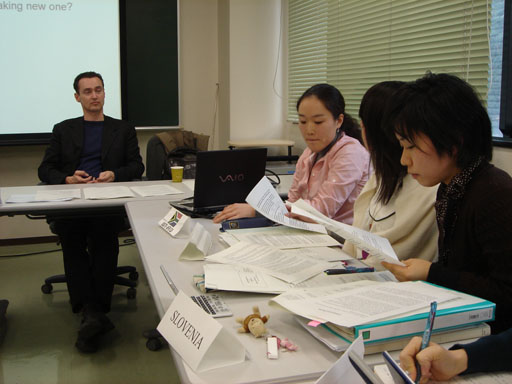
In addition, Mr. Lefeber answered many questions posed by the students regarding the legal issues involved in the “liability and redress” negotiations.
He friendly responded to casual questions from students during coffee break. Students attended to this special class have divergent carrier plans (e.g. diplomats, international civil servants, researchers, etc.), and he gave advices and told what he had in mind when he was young to be an international “negotiator.” 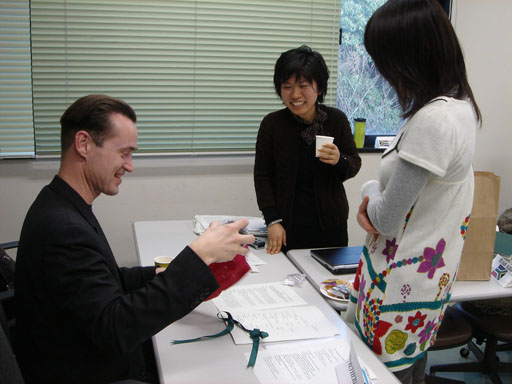
7 students among the participants in this special seminar actually attended the fourth meeting of the Ad Hoc Working Group on Liability and Redress held in Montreal, Canada in October 2007. They attended the meeting as a part of International Fieldwork, with credits. In addition, 4 students will also attend in the upcoming fifth meeting to be held in Cartagena, Columbia, in March 2008. These students were really excited to see the Co-Chair who, in the real negotiating meetings, is usually a person beyond reach. This special seminar and the International Fieldwork were a great opportunity for motivated students to feel and understand “how to use international law in the real world.” Finally we would like to thank Mr. Lefeber for coming to Kobe and gave us this most interesting seminar for us.
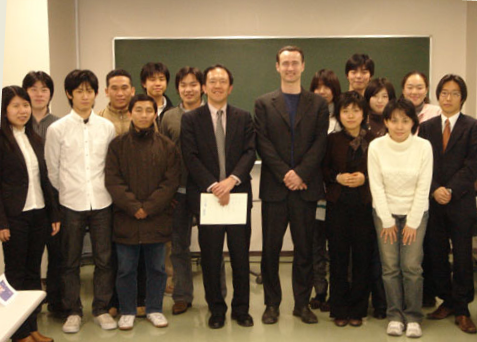
2006 International Cooperation Law (Fall)
Overall Explanation:
In the first part of the class, we will read five (5) chapters from a text book indicated below. I will give introductory remarks based on the reading and lead a discussion. All students are expected to read the chapter and actively participate in the discussion.
Shirley Scott, International Law in World Politics: An Introduction (Lynne Rienner Pub., 2004). The copies of relevant chapters will be provided by the Professor.
In the latter part of the class, we will conduct a mock diplomatic treaty negotiation. We will take up the case of “Non-compliance procedure” negotiation under the Rotterdam Convention. In order to provide you with the necessary basic knowledge on the Convention and the negotiating techniques, I will give a few lectures.
Class Schedule (tentative):
16 October: Introduction, explanation as to the content and schedule of the class, Students’ self-introduction
Part I: Reading Scott
23 October: Scott, Chapter 1 (International Law and World Politics Entwined)
30 October: Scott, Chapter 6 (Legal Arguments and Political Maneuvering)
6 November: Scott, Chapter 7 (Reading a Multilateral Treaty)
13 November: Class cancel due to Professor’s official mission to Tokyo
20 November: Scott, Chapter 8 (Te Evooution of a Multilateral Treaty Regime)
27 November: Class cancel due to Professor’s official mission to Kenya.
4 December: Shirley Scott, Chapter 12 on International Law and the Environment (2004).
Part II: Mock Diplomatic Negotiation
11 December: Explanation on the Rotterdam Convention
Reading Material:
Text of the Rotterdam Convention
Catherine Redgwell, “Regulating Trade in Dangerous Substances: Prior Informed Consent under the 1998 Rotterdam Convention,” in Kiss, Shelton and Ishibashi eds., Economic Globalization and Compliance with International Environmental Agreements (2003).
18 December: Explanation on Non-Compliance Procedures, focusing on the experience from the Basel Compliance Mechanism
Reading Material:
Akiho SHIBATA, “Basel Compliance Mechanism,” 12 RECIEL (2003), 183-198.
Basel Convention Decision VI/12 (2002) on Establishment of a mechanism for promoting implementation and compliance.
Rotterdam Convention document UNEP/FAO/RC/COP.3/12 on Non-Compliance.
References:
M.A. Fitzmaurice and C. Redgwell, “Environmental Non-Compliance Procedures and International Law, Netherlands YBIL Vil.31 (2000).
Homework during the vacation:
Analyze and develop each country’ position on the Rotterdam NCP, focusing on the contentious issues, and submit the “proposals for instruction” by e-mail by 9 December 2007. This “proposals for instruction” should be written in English or Japanese, maximum of 4 pages in A4 paper, focusing on the contentious issues (bracketed provision), and in word-format. You must clearly state the reasons (legal, political, or tactical) for taking such positions.
In analyzing and developing your country’ position, reference should be made to following documents.・Comments and Proposals on Non-compliance by Australia, Canada, European Commission, the Netherlands and Samoa, UNEP/FAO/PIC/INC.8/INF.2 (2001).
・Declaration of African Group on Illegal Trafficking, UNEP/FAO/PIC/INC.7/CRP.11 (2000).
Mock Treaty Negotiations
15 January: Explanation of negotiation techniques and provision of the instructions. Commence negotiation by electing the Chair, and deciding the schedule.
22 January: Explanation of positions by all delegations.
29 January: Negotiation focusing on Contentious Issues, possibility of establishing contact groups.
3 February (Saturday, tentative): Extensive negotiation, informal contacts, and conclusion of the negotiation.
5 February: Evaluation of the negotiation.









